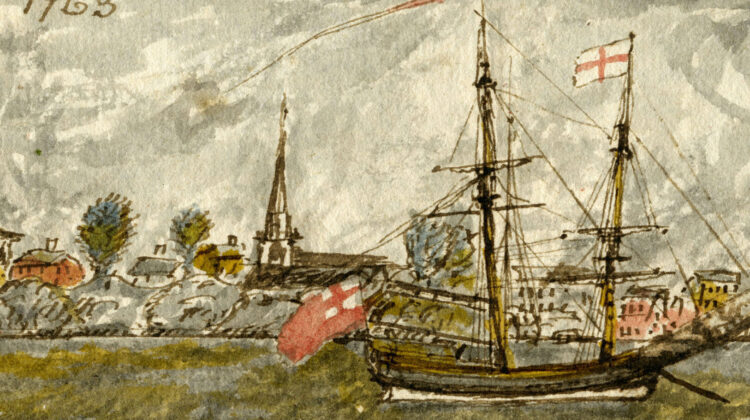When you dig through history, you’ll find many examples of memoirs written by sailors from around the world. However, Ashley Bowen is believed to have written the earliest memoir by an American sailor.
His journals also include illustrations he created over the years, including the first known image of Marblehead.
Bowen was born in 1728 to Nathan Bowen and Sarah Ashley. He embarked on his first journey at sea in 1739 at age 11, writing in his journal:
“This summer, as my father taught the art of navigation, Capt. Edmund Gale’s son Edmund and Mr. John Waldron, Mr. James Smith, and Mr. John Stone came to learn the art of him, and by that means I got so much acquainted with them that they would persuade my father to let me go to sea with them, and they carried it so far as to get Capt. Gale to speak to my father, and he concluded to let me go with them.”
Bowen was not a famous sailor. He didn’t make waves on the high seas, armies did not fear him, and he didn’t lead his country in war. However, his stories include firsthand accounts of witnessing the men who did.
Perhaps his most important writings came during the Siege of Quebec in the Seven Years’ War, where he joined the British forces onboard the Royal Navy’s HMS Pembroke.
There, Bowen sailed alongside two key historical figures: Capt. James Cook and Gen. James Wolfe. Cook was the master of the HMS Pembroke, and Wolfe commanded the British forces during the siege.
Cook has become known as one of the greatest navigators and explorers of all time, regarded as a hero in the Royal Navy and England.

Wolfe led England to victory and became one of its most celebrated military heroes.It was Wolfe who secured the British victory in Canada.
These are two figures history will forever remember. Thanks to Ashley Bowen, we get a glimpse into their lives during a critical time.
As mentioned earlier, Bowen wasn’t manning cannons or giving orders, but he did play a role in the siege. He was on one of the several vessels set to distract the French army while Wolfe and his men headed to the Plains of Abraham.
The Battle of the Plains of Abraham was a decisive engagement, in which Great Britain defeated France in a very short but crucial fight. The French retreated into the walls of Quebec, and the city soon fell.
During this account, Bowen wrote:
“At 6 p.m. Admiral (Saunders) made a signal for all boats manned and armed, and we went and made a feint at the River St. Charles, and at 11 I repaired on board our ship Pembroke.”
Bowen was also alive during the American Revolution. Many believe he was a Tory, an American colonist who supported the British. By this time, his seafaring days were over, and he had taken up work as a rigger, a job he began at 35.
He was drafted multiple times in 1777 but avoided serving. It is still unknown how he managed this.
His 1777 accounts also include a poem in which he acknowledges being a Tory at times. It begins:
During the revolution, some in town grew suspicious of Bowen. His rigging work suffered as rumors spread that he was a traitor. In 1778, his luck ran out when he was forced to join the war.
Bowen wrote: “1778. This is a year of trouble to me. I was drafted twice as a soldier and taken by Nathan Brown.”
After his service, Bowen returned home to Marblehead. The suspicion that he was a Tory faded, and he was once again able to resume work as a rigger.
Bowen continued documenting his life and those around him for many years. However, according to Philip Chadwick Foster Smith, who edited The Journals of Ashley Bowen (1728-1813) of Marblehead, the journals spanning 1800-1813 were never found. Instead, Bowen appeared in the diaries of other figures and in letters written either by him or to him.
Bowen was never a war hero or an explorer like Cook and Wolfe, but his accounts provide a unique window into history — through the eyes of an 18th-century Marbleheader.

